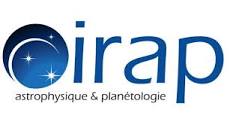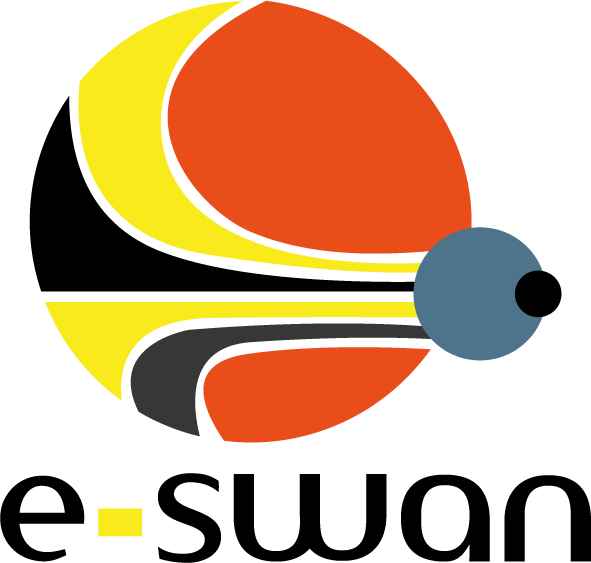E-SWAN School Series
Among its different missions, E-SWAN aims at promoting Space Weather and Space Climate through the dissemination of scientific knowledge, the promotion of education and advanced training and by raising awareness. To reach this goal, the E-SWAN Executive Board is happy to announce the inauguration of the E-SWAN school series: a Space Weather and Space Climate course given yearly during the days preceding the ESWW, at the location of the ESWW conference. The timing and location of the school are intentionally selected to lower our carbon footprint by reducing our travels.
1st E-SWAN school: Space Weather Data, Models and Services
Full program
1. IRAP Day, November 17
For the IRAP Day scheduled for November 17 from 9.45 a.m. to 5 p.m. (with tool presentations, tutorials and cleanroom visits), you must come directly to IRAP!
We'll welcome you at 9.15 a.m. with a coffee to finalize your registration for the whole week and give you your badge.
To get to IRAP, public transport is very convenient from the city center:
- either Metro B towards Ramonville Saint Agne (Faculté de Pharmacie stop), then Bus 78 towards Lycée Saint Orens (LAAS stop)
- or Bus 27 towards Ramonville Saint Agne (LAAS stop).
2. E-SWAN School at the Centre de Congrès Pierre Baudis, November 18-19
Classes start at 8:45 a.m. on both days in the SPOT room. Please add 10 minutes to your arrival time to pass through the security barriers at the entrance to the Congress Centre and finalize your registration for the whole week on Saturday.
3. School materials
- Please bring a pen and paper to school.
- It is also recommended that participants bring a laptop which will be used for exercises, tutorials and to check data sources.
Please install JHelioviewer on your laptop in advance (see https://www.jhelioviewer.org/).
For the IRAP day, please also install the latest version of JAVA (see http://storms-tools.irap.omp.eu/PropagationTool/ and look at "Supported set up" for instructions).
For whom?
This course is intended in priority for participants of the European Space Weather Week 2023 and will be given at an introductory level. The course is given in English.
When?
Friday 17 November 2023: Optional visit day
Saturday-Sunday 18-19 November 2023 from 09:00 to 17:00: Lectures
Where?
Toulouse, France (ESWW 19 venue)
Registration:
Registration open: 01 June 2023
Registration close: 15 October 2023 (closed)
Acceptance notification for non-ESWW participants: 20 October at the latest (closed)
For the others please contact
Lecture program:
2. Spheres of Earth and the Sun
3. Space Weather Phenomena explained: data, models, tools, predictions and warnings
4. Space Weather Impacts: case-studies
5. Space weather Impacts on Aviation
Number of participants
The maximum number of participants is 50 persons.
Fee:
For E-SWAN members
- 100€ for students
- 140€ for the others
Non E-SWAN members
- 140€ for students
- 200€ for the others
In all cases, lunches are included in the fee but travels and accommodation are not included.
For those students selected by E-SWAN after the first round of application (closed 29th of June): registration fees are waived; lunches and accommodation are provided for free (but travel is not).
Organized by
E-SWAN, Working Group 9 - Education and Outreach proto-Committee https://eswan.eu
STCE, The Solar-Terrestrial Centre of Excellence, https://www.stce.be
IRAP – Research Institute in Astrophysics and Planetology, https://www.irap.omp.eu
Contact
Friday Visit day description
As part of the E-SWAN school, IRAP proposes an optional day of work at the Institut de Recherche en Astrophysique et Planétologie in Toulouse, the main Astrophysics institute in the South-West of France, on Friday, November 19, 2023.
This day will be divided into several sessions of practical work dedicated to various public tools developed for space plasma physics and space weather forecasting. These tools can help visualize, manipulate, and perform sophisticated analysis on observational and simulation data of the solar corona, the solar wind, the magnetospheres and the ionospheres of the main planets of the solar system. Some of these tools also provide forecasts of the state of the solar corona, the solar winds and storms. A non-exhaustive list is available here:
http://propagationtool.cdpp.eu/
http://connect-tool.irap.omp.eu/ (and the associated Shock-SEP forecasting tool)
http://amda.cdpp.eu/
http://3dview.cdpp.eu/
http://transplanet.cdpp.eu/
In addition, guided tours will be proposed around the clean rooms of the laboratory, in which are built, tested and calibrated key instruments selected on many space missions of the main space agencies (Solar Orbiter, BepiColombo, JUICE, Comet Interceptor, HelioSwarm, but also Curiosity and Mars2020...).
The Friday Visit day is organised by IRAP.
IRAP Contact Persons:
Saturday-Sunday Course Content Description
Sporadic and massive eruptions of highly energetic matter and radiation from the Sun can trigger Space Weather processes in the near-Earth environment. Technological infrastructures on and around our planet are prone to Space Weather: satellite navigation and radio wave propagation can be impacted, as well as large energy transport systems like electrical power grids.
Human health is also endangered by Space Weather: harmful radiation at flight altitude can increase when a solar particle storm hits the Earth’s environment, exposing crews and passengers to increased particle radiation.
Impacted stakeholders want to learn about those natural hazards. The need for Space Weather knowledge is increasing fast as more nations, companies and industries want to increase their awareness and resilience, to bridge with the reference community and learn how products made available by its members can be suitable for specific needs.
The school covers the basics of space weather, space weather data, models, indices, alerts, forecasts and products.
The school offers guidance and an overview of the vast amount of online information offered by the STCE and other space weather centers. Special emphasis will be given to Space Weather indices: where to find them, how to interpret and use them. The monitoring, forecast and alerting services of the STCE and other space weather centers will be discussed, as well as the PECASUS consortium, which provides a Space Weather service for the International Civil Aviation Organisation (ICAO) in the form of advisories on impacts on GNSS, HF radio communication and increased radiation at flight altitude.
The Saturday-Sunday course is given by qualified STCE staff. Lectures on particular subjects will be given by STCE experts who gained expertise through scientific research, involvement in space missions as well as space weather operations, monitoring, and forecasting.
STCE Contact person:
About the STCE
In 1981, the Royal Observatory of Belgium (ROB) became the World Data Centre for the Sunspot index collecting sunspot data worldwide to calculate the International Sunspot Number (ISN). The ISN is an index used to quantify solar activity. Since the 90’s, the ROB has been involved in space missions, e.g. SOHO, PROBA2, Solar Orbiter, future PROBA3, … Our involvement in several space- and ground-based missions allowed us to improve our know-how in nstrumentation-building, as well as our expertise in solar physics and in the space weather domain. Already in 2001, the Royal Observatory of Belgium started operating a space weather room where researchers continuously collect, analyze and interpret solar data. Indeed, the Solar Influences Data analysis Center (SIDC - http://www.sidc.be/ ) issues every day a space weather bulletin that gives an update on how the Sun behaves, what the impact of a possible solar storm is and what can be expected for the coming days. The services offered by the SIDC have been expanding ever since. In 2006, these were further strengthened by the creation of the Solar-Terrestrial Centre of Excellence (STCE), a collaborative framework in which the sun-space-earth research and services of 3 Belgian scientific institutions were brought together. The STCE gathers in this way expertise in solar research, particle radiation, GNSS, ionosphere and geomagnetic measurements. In 2017, the STCE teamed up with scientific institutes in other European countries, jointly creating the Pan-European Consortium for Aviation Space weather User Services - PECASUS (http://pecasus.eu/) for short. The STCE's expertise in solar observations and research combined with the experience of its GNSS and solar particle radiation group proved to be crucial in the set-up of space weather services for civil aviation. PECASUS went live in November 2019. Since its start, the STCE has strongly invested in space weather courses and training relying on a firm academic and service experience.

About the IRAP
IRAP teams work on the study and understanding of the Universe and its content: the Earth as a planet, its ionized spatial environment, the sun and its planets, the stars and their planetary systems, the interstellar environment, galaxies, compact objects, the very first stars and the primordial Big Bang. This is done through observation, modeling and theory, instrumentation and laboratory experiments.

